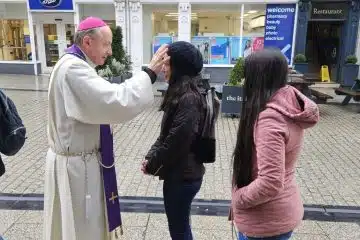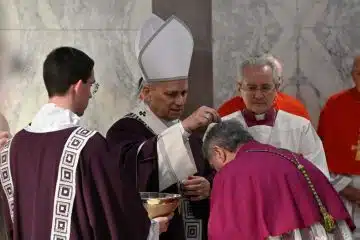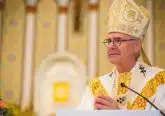More prelates reject delays of US bishops’ discussion of Eucharistic coherence
by CNA Staff
Denver Newsroom, May 27, 2021 / 16:58 pm
More Catholic bishops have spoken out in support of continuing as planned the process to address “Eucharistic coherence,” namely Christian life and worthiness to receive Holy Communion. The bishops have reacted after an American cardinal’s letter asked the bishops’ conference president, Archbishop Jose Gomez of Los Angeles, to postpone the discussions.
On May 25 Archbishop Alexander Sample of Portland in Oregon voiced his “full support” for Archbishop Gomez and for “the direction he has provided to the body of bishops regarding the question of Eucharistic coherence.”
“He has laid out a process which includes wide consultation on a particular timeline,” Archbishop Sample added. “Some of my brother bishops have asked to delay the process, but this would be a failure of our pastoral responsibility and a failure of collegiality.”
“It would also be contrary to the guidance recently provided by the Congregation for the Doctrine of the Faith,” he added. “I stand by Archbishop Gomez and the leadership of the USCCB, and their commitment to provide guidance on pastoral questions surrounding the Holy Eucharist.”
Communion for pro-abortion politicians is once again a topic of conversation, as both President Joe Biden and House Speaker Nancy Pelosi are Catholic and strongly support legal abortion and taxpayer-funded abortion.
The U.S. bishops’ working group on Biden’s presidency recommended a teaching document on “Eucharistic coherence.” However, a source close to the conference told CNA April 29 that discussion of the Eucharist – at either the bishops’ spring or fall 2021 meetings – would focus broadly on the Eucharist and on general worthiness to receive Communion, and that “nothing was in the works” specifically on Biden and Communion.
Blase Cardinal Cupich of Chicago, joined by other bishops, had recently written to Archbishop Gomez, in his role as bishops’ conference president. Cardinal Cupich’s letter asked that any discussion of “Eucharistic worthiness and other issues raised by the Holy See” by the bishops at their upcoming virtual spring meeting be postponed, until the conference can meet in person.
In his letter, Cardinal Cupich said that the gravity of the topic of the Eucharist necessitated an in-person discourse, and pointed to a recent letter from the Congregation for the Doctrine of the Faith.
The prefect of the congregation, Luis Cardinal Ladaria, had written Archbishop Gomez May 7, advising the U.S. bishops that if they were to issue any “national policy” on Communion for pro-abortion Catholic public officials, they would first need extensive and “serene” dialogue among themselves to ensure unity on the Church’s teaching.
Cardinal Cupich said that the unity which Cardinal Ladaria mentioned could not come about while the bishops held a virtual conference. He asked that bishops first discuss the matter in person, by region, before gathering in person as a conference to discuss any teaching document on the Eucharist.
Bishop James Conley of Lincoln had his own reaction to that letter. He said he was “surprised and dismayed” when he learned that a group of bishops had written to ask for a delay.
“If the polls are correct, some 70% of Catholics do not believe in the real presence of Christ in the Eucharist. Now is not the time to suspend discussion among the U.S. bishops on the question of Eucharistic coherence at our upcoming June meeting,” Bishop Conley said in a May 26 statement.
“We do not need less discussion but rather more discussion on the mystery, beauty and gift of the Holy Eucharist,” the bishop said. “At our last general assembly in November, the U.S. bishops voted overwhelmingly in favor of the process of preparing a document that would address these issues.”
Bishop Conley too voiced his “full support” for Archbishop Gomez and his plan.
“It seems to me that to thwart this process would be to shirk our responsibility as shepherds,” he said. Cardinal Ladaria’s counsel, he thought, “in no way precludes a serene and honest discussion on the part of the U.S. bishops on the topic of Eucharistic coherence.”
“Ultimately, it is a question of unity and love in the Body of Christ,” Bishop Conley continued. “The Eucharist is a sign of unity, and it calls all of us to live lives that are integrated; lives where our faith and our actions are consistent and coherent. The Eucharist is also a sign of love, the mission of love we share with Jesus for the salvation of the world.”
Archbishop Sample’s and Bishop Conley’s statements follow comments from other bishops.
In a May 25 statement provided to CNA, Archbishop Salvatore Cordileone of San Francisco told CNA he was “deeply grieved” by what he said was “the rising public acrimony among bishops and the adoption of behind-closed-doors maneuvers to interfere with the accepted, normal, agreed-upon procedures of the USCCB.”
Bishop Joseph Strickland of Tyler voiced support for Archbishop Cordileone on Twitter, saying May 26: “Thank you Archbishop Cordileone… I am with you… let us be pastors.”
Archbishop Samuel Aquila of Denver commented on Tuesday that the problem of Eucharistic coherence is primarily “a question of love, a question of charity toward our neighbor”, citing St. Paul’s warning that it is a danger to a Christian’s soul to receive the Eucharist unworthily.
Archbishop Aquila said that the Congregation for the Doctrine of the Faith’s instructions to the bishops call for dialogue – which is the plan for the action item of the spring meeting.
Bishop Thomas Paprocki of Springfield in Illinois voiced support for Archbishop Gomez and the U.S. bishops’ conference leadership. In a May 26 statement, he noted that the phrase “Eucharistic coherence” appeared in the 2007 Aparecida Document of the Latin American and Caribbean bishops, a document which then-Cardinal Bergoglio, now Pope Francis, had a “crucial role” in developing.
In that 2007 document, the bishops noted the role of public officials in defending the sanctity of life on issues such as abortion and euthanasia. When Catholic officials support these and “other grave crimes against life and the family,” they are not to present themselves for Communion, the bishops said.
Bishop Paprocki added that the teaching on Eucharistic coherence draws from canon law, which bars those who “obstinately persist in manifest grave sin” from being admitted to Holy Communion.













